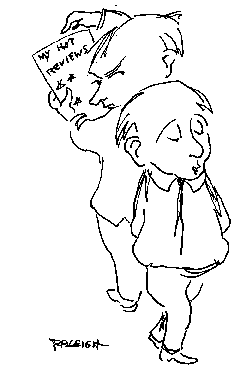 |
Does
Film Criticism Have a Future?By
HENRY P. RALEIGH
ART TIMES July August 2008
I
DON’T WANT to belabor this issue, you know, yet, alarmingly it does
keep coming up. Not long ago the critic A.O. Scott, in a tribute
to a fellow critic, Roger Ebert, put the question right out there
— and in the New York Times no less: “Does film criticism
have a future?” Actually the same question was asked by another
critic, Richard Corliss, in a 1990 essay so you can see nothing
has gotten any better. I know how these fellows feel. My own entrée
to their beleaguered ranks was via the philosophy of art, a field
laughingly referred to in academia as a ‘dismal swamp’. Well dismal
it may be, but it’s a lot of fun — so put that in your
mortar board and smoke it.
Nevertheless
there’s no denying that things are getting tougher. Maybe it’s the
recession. Maybe it’s all those bloggers freely spewing their uninformed
opinions all over the internet. Mr. Scott in that same Times
article revealed that a writer for the Salt Lake Tribune
(to show you how far bad news spreads) came up with a list of
27 critics dropped from various publications. I wasn’t on the list,
you’ll be happy to learn. But then I’m not on anyone’s payroll,
so to speak, and I would bet few of the 27 were either — most
being ‘contributors’, the favored term for expendable print writers
nowadays. That’s sort of like being thought of as someone who makes
gratis contributions to the Red Cross or Good Will and receives
heart-felt thanks and that’s about it.
Now
I’m the first to confess ours is an imperfect science even though
it’s fun. I’ve reported numerous times on the remarkably wide disparity
among film critics regarding the best and the worst of any single
year’s film productions. I understand and certainly sympathize with
your confusion when coming upon quite contradictory reviews of the
same film. Take, for example, this Rex Reed review of the recent,
“My Blueberry Nights”, that appeared in The New York Observer.
Mr. Reed is second to none in tossing out zingers, I can tell
you. “Diner drivel”, sneers Mr. Reed. The film’s title “…is every
bit as meaningless as the rest of the movie.” On the chance a reader
might have missed the point, he goes on to, “…nothing about “My
Blueberry Nights” makes any kind of coherent sense.” Never weary
of beating a dead horse, the film is, “…boring, pointless and narcotic.”
And of Norah Jones’ acting debut, “She can’t act.”
It would be sadistic to include here the entire demolition of Mr. Reed’s
accompanying review of “Sex and Death 101” — a sampling should
give you the idea: “…jejune, pretentious third grade blather”, a
movie that “…just lies there waiting for Tuesday and garbage collecting
day.” So would you care to lay out ten bucks to see these films?
I ask you?
But
hold on a moment. Turn the page in this same issue of the Observer
and there is Andrew Sarris’ critique of “My Blueberry Nights”.
Mr. Sarris finds the filmmaker, Wong Kar Wai in his first English
language feature, has made this venture without “sacrificing his
artistic soul and very personal visual style”. Why, Mr. Sarris is
more than willing this early in the game to include the film among
the 10 best of 2008 — a love story told “beautifully and passionately”.
Can this be the same film that Mr. Reed saw? Now it’s true that
Mr. Sarris was not fond of “Sex and Death 101” either, yet he was
nowhere near as bloodthirsty about it as Mr. Reed, even noting moments
of “wit and lucidity”. Where Mr. Sarris cheered Winona Ryder for
returning to film “projecting her distinctive personality”, Mr.
Reed dismisses her return as “dubious”. Are these people crazy?
I ask you?
And
as for the aforementioned Mr. Corliss, it’s worth reading his withering
analysis of the 1970 “MASH” in his Talking Pictures: Screenwriting
in American Cinema 1927-73, this after every critic on the planet
had praised the film to high heaven and beyond. To complete the
burial he even demolished the critics who had gone for it, signaling
our Pauline Kael who had called “MASH”, “…the best American war
comedy since sound came in.” It’s no wonder Mr. Corliss was ready
to throw in the towel in 1990. Is he crazy? I ask you?
Now
can a film audience make anything out of all this? Where is the
trustworthy guidance viewers surely must yearn for? The truth of
it is, however, that the film audience doesn’t pay one whit of attention
to film critics. If they did, Adam Sandler would have been out of
business long ago. For the most part film critics are talking to
each other and a handful of devoted followers who delight in seeing
how wrong they can be, Still, you must admit a good piece of nasty
criticism can make you think harder about a film you thought was
pretty hot stuff.
Film
criticism is a lot of fun as those bloggers crowding cyberspace
have found out and it’s perfectly harmless. What other professions
are there where you can be as ignorant as a post and make colossal
errors of judgment and it doesn’t change a thing? I ask you?
